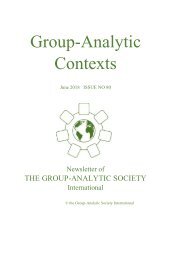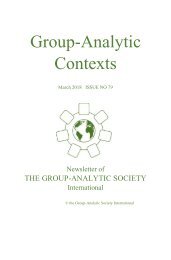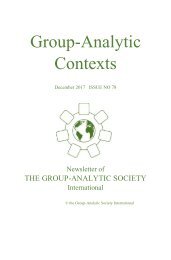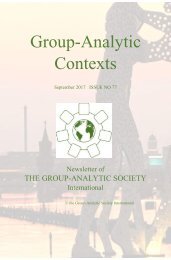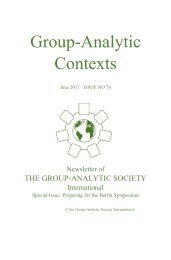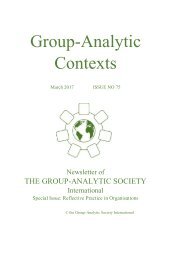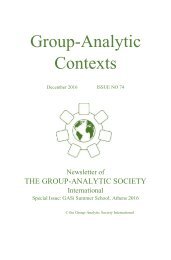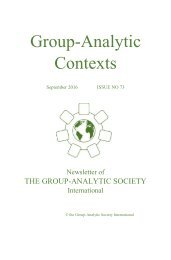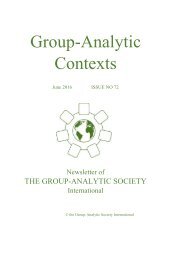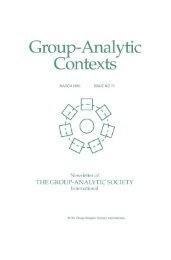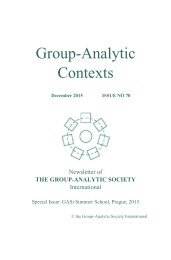Group-Analytic Contexts, Issue 81, September 2018
Newsletter of the Group Analytic Society International
Newsletter of the Group Analytic Society International
You also want an ePaper? Increase the reach of your titles
YUMPU automatically turns print PDFs into web optimized ePapers that Google loves.
Newsletter – Autumn <strong>2018</strong> 61<br />
It was hard to know why he did what he did. He didn’t need the money.<br />
In the prison he’d said that he was just greedy but then the Visitors<br />
had questioned the evolution of greed. They refused to imagine ‘just’<br />
anything. They were curious about the motivation that lay behind<br />
anything he had ever done. They were less interested in actions or<br />
‘obeying the law’ than they were in how such things came about.<br />
What is the impact on a relationship when apparently identical<br />
behaviour is motivated by a loving impulse rather than the<br />
anticipation of gain? This was a question that they’d asked him in the<br />
prison and was back in his mind as he looked at the politician,<br />
surprisingly untroubled by his proximity to Jason. Why had they asked<br />
him that question? Why had they invited him to conduct the group?<br />
Was he becoming as interested in motivation as they were?<br />
Strangely, since the invitation, his inclination to use the<br />
situation to his advantage had ebbed away. At times, he hardly<br />
recognized himself. He’d become interested in people’s stories. He<br />
didn’t feel altruistic: he felt fed by the interactions. He particularly<br />
liked the eye contact he made with others when they were talking<br />
about fathers: his loneliness was shared – some kind of internal pond<br />
became less congealed and good memories slipped through a<br />
previously impermeable filter. He was intrigued by the evolution of<br />
the politician who’d been so absent from his daughter and seemed to<br />
have had so many affairs. He’d found the interaction between Jason,<br />
the terrorist and the nurse extraordinary. He’d felt fond of Jason when<br />
he’d given up his chair to the woman who heard voices.<br />
It was very different than the buzz he got from a scam. That<br />
was more of an instant hit: this offered less familiar sensations. He felt<br />
more joined up. He felt warmed by his interactions with the men –<br />
awkward with the women. Initially images of interactions with his<br />
mother returned when the therapist or the manager looked at him in a<br />
particular way; the pond thickened and the filter closed the flow of<br />
memory and sensation. But increasingly, he was drawn in and even<br />
found himself caring about what happened to these strangers. He<br />
listened intently when others spoke about parents who’d been<br />
unavailable in ways he’d never thought about. He belonged when they<br />
were talking about loneliness and longing. Was everyone really<br />
deprived in some way?<br />
But the Visitors didn’t seem to tolerate insights where anyone<br />
could rest. What had they meant when they asked whether<br />
disturbances allowed for new possibilities? He tried to remember in<br />
sequence all the questions of the Visitors so that he had some sense of<br />
the order of things. Was this the familiar calculating part of himself?



